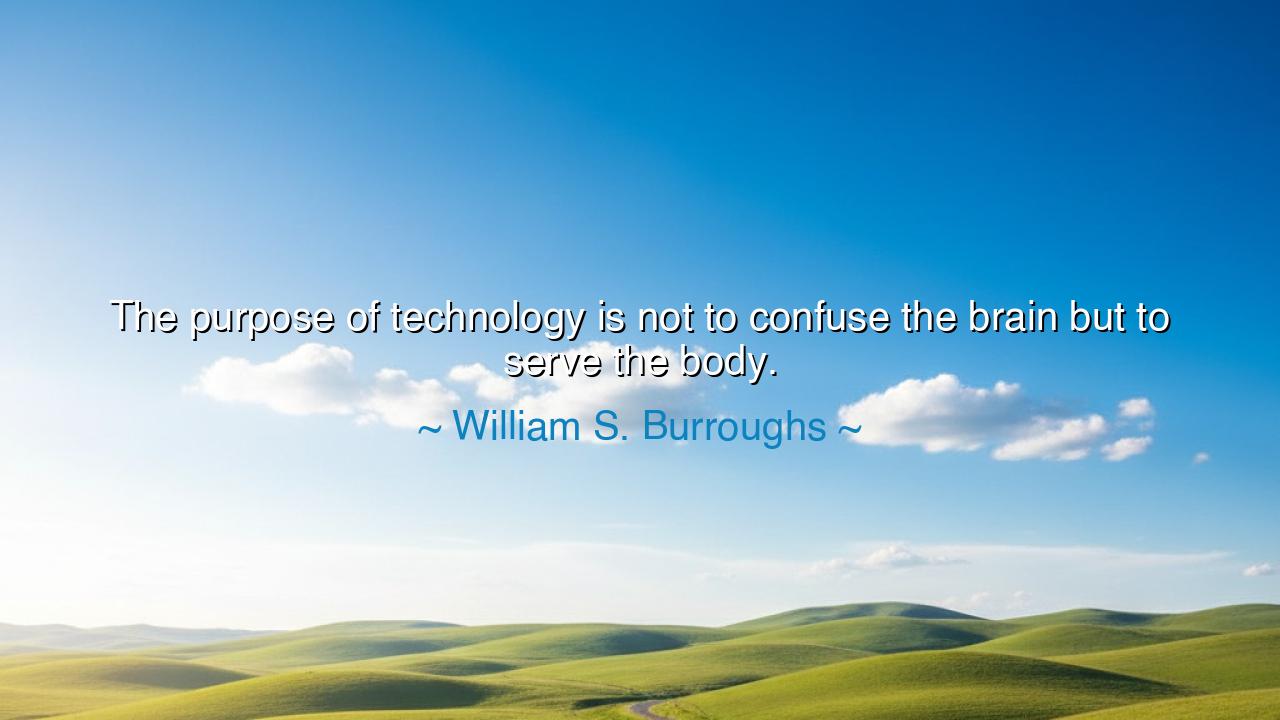
The purpose of technology is not to confuse the brain but to






The words of William S. Burroughs—“The purpose of technology is not to confuse the brain but to serve the body”—resound like a warning and a reminder, spoken to an age drunk on invention. For the essence of technology is not to dazzle, nor to enslave us with endless noise, nor to draw us away from the earth and the flesh. Its purpose is humbler, yet far more profound: to ease the burdens of the body, to lengthen its strength, to protect it from suffering, to make life more livable. When technology ceases to serve and begins to dominate, when it overwhelms the mind with confusion rather than supporting the body with freedom, it has strayed from its true calling.
The origin of this thought lies in the nature of human invention itself. From the beginning, men did not invent tools to be dazzled by them, but to survive. Fire was not meant to hypnotize with its flames, but to warm and to cook. The wheel was not made to confuse, but to carry burdens the back could no longer bear. The plow was not created to distract the mind, but to break the earth and feed the belly. In every age, the great inventions that endured were those that honored this principle: they served the body, and by serving the body, they preserved the life of the soul.
Consider the printing press. Its power was not in confusing the mind with excess, but in serving humanity’s hunger for knowledge. It placed books, once chained to monasteries, into the hands of common people. Yet in our own age, the same principle is reversed: screens glow with endless information, not always to serve but often to consume, not to nourish the body and spirit but to drown them in distraction. Here lies Burroughs’ warning: technology that bewilders the brain instead of strengthening life has turned against its true purpose.
History also teaches us through the story of medicine. The discovery of anesthesia and antiseptics were triumphs because they served the body, lessening pain and preserving life. They did not confuse, they clarified the relationship between suffering and healing. Yet when medicine becomes tangled in unnecessary complexity, when machines overwhelm both patient and doctor, the humanity of healing risks being lost. Technology must remain the servant of life, not its master.
Burroughs’ words also reveal a spiritual dimension. For the body is not merely flesh, but the vessel of human existence. When technology honors the body—its need for health, for rest, for movement, for dignity—it uplifts all of life. But when it burdens the mind with endless signals, notifications, and artificial anxieties, it weakens the very vessel it was meant to preserve. To serve the body is to serve humanity. To confuse the brain is to betray it.
The lesson for us is clear: we must measure all technologies not by their novelty, nor their glamour, but by their service. Does this tool lighten the weight of living? Does it strengthen health? Does it save time for love, for creation, for rest? Or does it enslave the mind with distraction, feeding it confusion while leaving the body weaker? These are the questions we must ask. If the tool serves, embrace it. If it confuses, cast it aside.
In practice, this means using technology with discipline. Let it guard your health, but do not let it consume your peace. Let it carry your burdens, but do not let it chain your attention. Learn to rest your eyes from the screen, to let your hands touch earth and wood, to feel once again the strength of the body that all machines were meant to honor. Technology is a servant; do not let it become your master.
So let Burroughs’ words endure as a guide: “The purpose of technology is not to confuse the brain but to serve the body.” When invention remembers this sacred purpose, it uplifts mankind, carrying us further on the road of life. But when it forgets, it becomes a snare. Let us be masters who demand from our tools not confusion, but service, not noise, but freedom. For in serving the body, technology fulfills its highest calling: to preserve and uplift the dignity of life itself.






AAdministratorAdministrator
Welcome, honored guests. Please leave a comment, we will respond soon